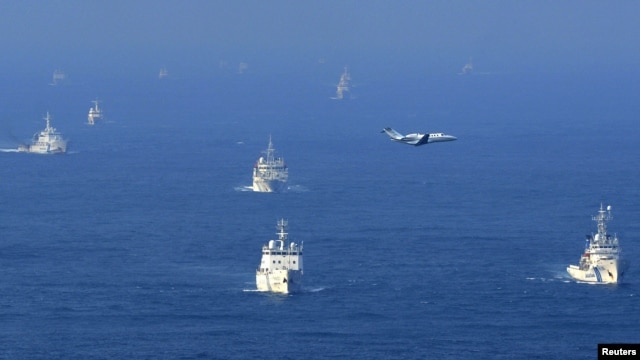
An aerial photo from Kyodo News shows Chinese ocean surveillance, fishery patrol ships and a Japan Coast Guard patrol ship (R and 2nd L) sailing about 27 km (17 miles) west from a group of disputed islands in the East China Sea, September 18, 2012.
Japan's Coast Guard says at least two Chinese government vessels have entered territorial waters near Japanese-controlled islands, as a dispute escalates on the sensitive anniversary of Japan's invasion of China.
The vessels are among 11 Chinese ships spotted Tuesday near the East China Sea islands, known as Senkaku in Japan and Diaoyu in China. Japanese authorities earlier turned away another Chinese patrol ship.
Two Japanese activists briefly landed on one the islands Tuesday, prompting an angry response from China's Foreign Ministry, which called the act a "gravely provocative" violation of Chinese sovereignty.
The dispute over the mostly uninhabited islands led to a day of anti-Japan protests in major cities across China. In Beijing, at least 1,000 protesters marched outside the Japanese embassy, holding signs, chanting nationalistic slogans and calling for China to defend its claim to the islands. Many Japanese companies, including Honda, Toyota, Mitsubishi and Panasonic have cut back operations in China because of sporadic outbreaks of violence.
Tuesday is the 81st anniversary of the so-called Manchurian Incident, a pretext Japan used to invade China in 1931.
Chinese Defense Minister Liang Guanglie on Tuesday said his country reserves the right to take "further actions" to resolve the dispute. But he said he hopes the feud could be settled peacefully. Liang made his comments in Beijing following a meeting with his U.S. counterpart Leon Panetta, who has urged both sides to exercise restraint and not let the situation escalate.
Earlier Tuesday, fears of a maritime conflict were raised when Chinese state media reported that a flotilla of 1,000 Chinese fishing boats was headed to the islands. Japanese Coast Guard officials did not confirm the arrival of the boats, but said an operation has been set up to monitor their movement.
David Fouse, a Japan analyst at the Hawaii-based Asia-Pacific Center for Security Studies, says that neither side wants an escalation of the dispute.
"I think the two governments will have to both sit down and realize that its in their respective mutual interest to resolve this in a peaceful manner and not let public sentiment get too negative to where its going to have a negative impact on their economic relationship," he said.
China and Japan, Asia's two largest economies, boast strong trade ties. Two-way trade was more than $342 billion last year. Some fear that relationship may be affected by the dispute, since Chinese officials have hinted that economic sanctions are possible.
Tension between Japan and China have heightened since Japan said last week it would purchase some of the islands from their private Japanese landowner. Since then, anti-Japan protests have been held across China. In some cases, the protests have turned violent and have included attacks against Japanese-owned businesses. |
|
